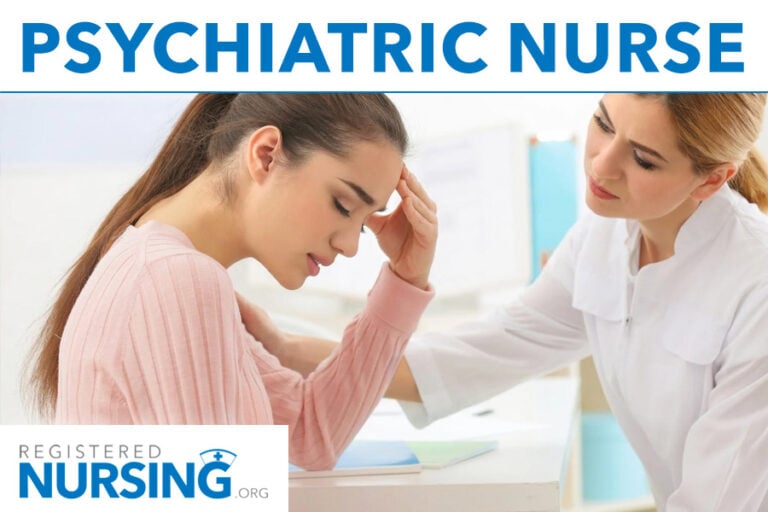Psychiatric Nurse

What is a Psychiatric Nurse?
The psychiatric nurse specializes in caring for patients receiving treatment for a variety of mental illnesses, addiction, eating disorders or substance abuse. Patients with psychiatric disorders require a great deal of emotional support, education, and therapy from skilled mental health professionals. Working with patients and the interdisciplinary team, including case managers and social workers, to assess and provide a safe discharge environment is a large part of the day-to-day of a psychiatric nurse. This specialty is suited to the nurse who is patient and kind, but not afraid to lay down some boundaries when necessary.
How to Become a Psychiatric Nurse
Those who know they want to become a psychiatric nurse should plan on taking a few mental health courses while in school. Upon becoming an RN, most nurses gain experience in general nursing before they move into the psychiatric specialty, although it's not unheard of for a new grad nurse to go right into psychiatric nursing. One way to break into psychiatric nursing is to determine a focus; geriatric care, eating disorders, and child/teen mental health are just a few of the specialized areas a psychiatric nurse may consider finding work.
In some situations, some psychiatric nurses can subspecialize in their respective fields or based on where they work. Here are a few psychiatric nurse subspecializations that you may come across in your training:
| Subspecialization | Description | Roles and Responsibilities |
| Child and Adolescent Psychiatric Nurse | Specializes in mental health care for children and teenagers. | Assess mental health needs of children and adolescents, provide age-appropriate therapies, collaborate with families, schools, and healthcare providers, manage medication plans. |
| Geriatric Psychiatric Nurse | Focuses on mental health care for elderly patients. | Address mental health issues related to aging, provide support for dementia and depression, manage medication, collaborate with caregivers and healthcare teams |
| Forensic Psychiatric Nurse | Works within the criminal justice system, treating patients involved in legal cases. | Conduct mental health assessments for individuals in legal settings, provide care in correctional facilities, testify in court, support rehabilitation efforts. |
| Substance Abuse Psychiatric Nurse | Specializes in treating patients with substance use disorders. | Provide addiction counseling and support, develop and implement treatment plans, monitor detoxification processes, collaborate with multidisciplinary teams for comprehensive care. |
| Consultation-Liaison Psychiatric Nurse | Acts as a bridge between psychiatry and other medical fields. | Provide mental health consultations in general healthcare settings, assist with mental health management for medically ill patients, educate healthcare staff on psychiatric issues. |
| Military Psychiatric Nurse | Provides mental health care to military personnel and veterans. | Address PTSD, anxiety, and depression in military populations, support reintegration into civilian life, collaborate with military healthcare teams, provide crisis intervention. |
| Community Mental Health Nurse | Works in community settings to support mental health for populations at large. | Provide outreach services, develop community-based mental health programs, offer education and support, advocate for mental health resources and policies in the community. |
| Psychiatric Nurse Practitioner | An advanced practice role with the ability to diagnose and prescribe medication. | Conduct comprehensive mental health assessments, diagnose psychiatric disorders, prescribe medications, provide psychotherapy, manage ongoing care for patients. |
What Are the Schooling Requirements for Psychiatric Nurses?
Education requirements include holding an active RN license, which may be achieved via an Associate's Degree in Nursing or a Bachelor's degree at an accredited school. The trend in the healthcare industry is shifting toward primarily hiring BSN-educated registered nurses, but this is not currently an enforced requirement. Earning more education, however, will make an RN more money and create better opportunities.
Are Any Certifications or Credentials Needed?
The Psychiatric–Mental Health Nursing Certification, or RN-BC, may be required by some facilities after a set amount of time after hire.
Eligibility for the RN-BC includes:
- Have practiced the equivalent of 2 years full-time as a registered nurse
- Have a minimum of 2,000 hours of clinical practice in psychiatric–mental health nursing within the last 3 years
- Have completed 30 hours of continuing education in psychiatric–mental health nursing within the last 3 years
Read more for further clarify on psychiatric nurse certifications.
Psychiatric Nurse FAQs
Public health emergencies and disasters often have unique challenges that require flexible solutions. Different disasters and emergencies necessitate different health service needs, depending on who they impact and how.
Exposure to disasters, including hurricanes, fires, floods, and contagious disease outbreaks can severely affect many individuals' mental health, which can add to the rising needs of services that are already stretched thin.
During times of crisis, it is critical that mental health professionals, including psychiatric nurses and psychiatric-mental health nurse practitioners (PMHNPs), provide services immediately after the event. Populations exposed to traumatic events frequently experience anxiety, depression, grief, and mental stress. It is not uncommon for people to attempt to regulate their mental disorders through alcohol and substance abuse. If mental health professionals cannot make themselves available physically - for instance, due to road closures after a natural disaster - telehealth options can be utilized to ensure that patients are able to access care quickly.
Following an emergency or natural disaster, it is normal for mental health administrators to be overextended. Through careful planning, implementation, and community efforts, clinics can apply trauma knowledge to their communities. Survivors of natural disasters must get the PTSD care they need, along with other mental health needs.
Mental health professionals, especially psychiatric nurses, are in high demand in the face of shortages, especially in rural areas. According to reports, one in five Americans has a mental health or substance abuse issue. Across the country, many patients are burdened with unmet needs, which is where telehealth comes in.
Mental health treatments do not rely on a physical exam or contact to treat medical conditions. Most mental health sessions rely on emotional connections and the ability to hold conversations. Often, a video or phone platform is sufficient for creating a safe space. During times of crisis or natural disasters, telehealth psychiatric sessions can remove stress and fears that come with traveling beyond the safety of one’s home.
Telehealth services can impact mental health by addressing the nationwide shortage of mental health professionals. Now, a psychiatric nurse can extend their geographic sessions and treat patients who are hundreds of miles away. This allows our telehealth psychiatric care to grow and meet the demands of many Americans.
Access to mental health services is critical, especially for mobility-challenged patients, those unable to leave the house, those lacking dependable transportation, and those who live in remote areas. Many psychiatrists and therapists are able to lower their hourly fees to treat low-income patients without having to leave their homes.
What Does a Psychiatric Nurse Do?
Psychiatric nurses treat patients with varying mental health or behavioral problems. They often assist in assessing and diagnosing patients, monitoring symptoms and behaviors, and providing short or long-term care. This type of nurse also typically has a hand in developing care plans for psychiatric patients, as well as educating and working with the patient's family to ensure follow-through with home care.
Where Do Psychiatric Nurses Work?
Psychiatric nurses work in a variety of healthcare settings where mental health is practiced. This typically includes:
- Hospitals
- Private practices
- Mental health facilities
- Community clinics
- Schools
- Correctional facilities
- Long-term care facilities
What Are the Roles and Duties of a Psychiatric Nurse?
- Assess mental health symptoms and help to diagnose and treat patients
- Monitor patients in a psychiatric facility
- Educate family members about a patient's condition and care plan
- Work alongside psychiatric doctors and other mental health specialists as part of a comprehensive psychiatric care team
- Connect patients with programs and services
- Help patients set and hit short and long-term mental health goals
- Assist patients with medications
Psychiatric Nurse Salary & Employment
The average salary of a psychiatric nurse is $85,000 in the US with a range of $71,245 – $106,015. Things like level of education, place of employment, location, and experience will affect salary.
| Average Yearly Salary | |
| Bottom Earners | $71,245 |
| Bottom 25% | $77,800 |
| Median | $85,000 |
| Top 25% | $96,000 |
| Top 10% | $106,015 |
The aging population means that the employment outlook for a psychiatric nurse is good, since the elderly typically experience a higher rate of cognitive illness. Communities are also generally in high need of mental health nurses in clinics and hospitals in underserved areas.
Helpful Organizations, Societies, and Agencies
- American Psychiatric Nurses Association
- International Society of Psychiatric-Mental Health Nurses
- Association of Advanced Practice Psychiatric Nurses
- Journal of the American Psychiatric Nurses Association
- Journal of Psychiatric and Mental Health Nursing








